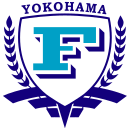Yokohama Flügels facts for kids
 |
|||
| Full name | ANA and Sato Lab soccer club (Yokohama Flügels is considered as shortened name used by newspapers and media) | ||
|---|---|---|---|
| Nickname(s) | Fulie | ||
| Founded | 1964 as All Nippon Airways S.C. | ||
| Dissolved | 1999 | ||
| Ground | Mitsuzawa Stadium, Yokohama | ||
| Capacity | 15,046 | ||
|
|
|||
Yokohama Flügels (横浜フリューゲルス) was a Japanese football club. They played in the top Japanese league, the J.League, from 1993 to 1998. The club was one of the first ten teams to join the J.League in 1993.
In 1999, the club officially joined with their local rivals, Yokohama Marinos. The new team was called Yokohama F. Marinos. However, many Flügels fans did not want to support the new team. They felt their club was gone, not truly merged. So, these fans started their own new club, called Yokohama FC.
Contents
Club History
The club started as a company team for All Nippon Airways (ANA) in 1964. For a while, they were called Yokohama TriStar SC. But after a big event involving ANA, they went back to using the ANA name. This happened when they were trying to get promoted to the Japan Soccer League in the early 1980s.
They moved up to the JSL's Second Division in 1984. They quickly made an impact, finishing second and moving up to the First Division. They were relegated in 1985 but came back up in 1987. After that, they stayed in the top league until the club ended.
What Does "Flügels" Mean?
When the club became professional for the J.League, they chose the name "Flügels". This name comes from the German word Flügel. It means wing or wings. The name was a nod to their main sponsor, All Nippon Airways, which is an airline. For a time, the club was also called AS Flügels. The "AS" came from the first letters of their two main sponsors, ANA and Sato Labs. It also sounded like "Sporting Association" in Italian and French.
Club Successes
Yokohama Flügels never won the main JSL or J.League title. However, they were a strong team from the late 1980s until their last game. They won several important awards both in Japan and in Asia. These included the Emperor's Cup in Japan. They also won the Asian Cup Winners' Cup and the Asian Super Cup internationally.
The Merger and New Club
In 1998, one of their main sponsors, Sato Labs, announced they would stop giving money to the club. Instead of just closing the club or finding a new sponsor, ANA, the other main sponsor, met with Nissan Motors. Nissan was the main sponsor for their rivals, Yokohama Marinos. They announced that the two Yokohama clubs would join together. Most Flügels players would then join the Marinos team.
The letter "F" was added to the new club's name, "Yokohama F. Marinos". This "F" was supposed to show that the two clubs had merged. But Flügels fans did not like the merger. Instead, the fan club decided to start their own team. They used a model like the famous Spanish club Barcelona. This led to the creation of Yokohama FC. It was the first professional Japanese football club owned and run by its own members.
Final Game
On January 1, 1999, Flügels played their very last match. It was the 1998 Emperor's Cup Final against Shimizu S-Pulse. Flügels won the game 2–1. Because they were merging, Shimizu S-Pulse took their place in the next 1999 Japanese Super Cup and the Asian Cup Winners' Cup. Shimizu S-Pulse even won the Asian Cup Winners' Cup against an Iraqi club called Al-Zawraa.
Flügels was the second club to leave the top Japanese football league and close down. The first was Eidai Industries in 1976. That club also closed because it cost too much money to keep a top-flight team.
Club Honours
Yokohama Flügels won these important titles:
In Japan
- Regional Promotion Series: 1983
- JSL Division 2: 1987–88
- Emperor's Cup: 1993, 1998
In Asia
- Asian Cup Winners' Cup: 1994–95
- Asian Super Cup: 1995
Mascot
Yokohama Flügels had a mascot named Tobimaru. He was a flying squirrel. Tobimaru wore the team's uniform and had cyan and white wings. He also wore an aviator helmet. After the Flügels club closed, Tobimaru was put on display in the Japan Football Museum.
Anthem
The Flügels' team song was a new version of the song "Victory" by the Japanese rock band The Alfee. It had new lyrics for the team.
See also
 In Spanish: Yokohama Flügels para niños
In Spanish: Yokohama Flügels para niños
 | Mary Eliza Mahoney |
 | Susie King Taylor |
 | Ida Gray |
 | Eliza Ann Grier |

